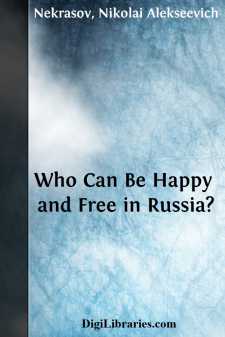Categories
- Antiques & Collectibles 13
- Architecture 36
- Art 48
- Bibles 22
- Biography & Autobiography 813
- Body, Mind & Spirit 142
- Business & Economics 28
- Children's Books 15
- Children's Fiction 12
- Computers 4
- Cooking 94
- Crafts & Hobbies 4
- Drama 346
- Education 46
- Family & Relationships 57
- Fiction 11828
- Games 19
- Gardening 17
- Health & Fitness 34
- History 1377
- House & Home 1
- Humor 147
- Juvenile Fiction 1873
- Juvenile Nonfiction 202
- Language Arts & Disciplines 88
- Law 16
- Literary Collections 686
- Literary Criticism 179
- Mathematics 13
- Medical 41
- Music 40
- Nature 179
- Non-Classifiable 1768
- Performing Arts 7
- Periodicals 1453
- Philosophy 64
- Photography 2
- Poetry 896
- Political Science 203
- Psychology 42
- Reference 154
- Religion 513
- Science 126
- Self-Help 84
- Social Science 81
- Sports & Recreation 34
- Study Aids 3
- Technology & Engineering 59
- Transportation 23
- Travel 463
- True Crime 29
Who Can Be Happy and Free in Russia?
Description:
Excerpt
NICHOLAS NEKRASSOV: A SKETCH OF HIS LIFE
Western Europe has only lately begun to explore the rich domain of Russian literature, and is not yet acquainted with all even of its greatest figures. Treasures of untold beauty and priceless value, which for many decades have been enlarging and elevating the Russian mind, still await discovery here. Who in England, for instance, has heard the names of Saltykov, Uspensky, or Nekrassov? Yet Saltykov is the greatest of Russian satirists; Uspensky the greatest story-writer of the lives of the Russian toiling masses; while Nekrassov, "the poet of the people's sorrow," whose muse "of grief and vengeance" has supremely dominated the minds of the Russian educated classes for the last half century, is the sole and rightful heir of his two great predecessors, Pushkin and Lermontov.
Russia is a country still largely mysterious to the denizen of Western Europe, and the Russian peasant, the moujik, an impenetrable riddle to him. Of all the great Russian writers not one has contributed more to the interpretation of the enigmatical soul of the moujik than Russia's great poet, Nekrassov, in his life-work the national epic, Who can be Happy in Russia?
There are few literate persons in Russia who do not know whole pages of this poem by heart. It will live as long as Russian literature exists; and its artistic value as an instrument for the depiction of Russian nature and the soul of the Russian people can be compared only with that of the great epics of Homer with regard to the legendary life of ancient Greece.
Nekrassov seemed destined to dwell from his birth amid such surroundings as are necessary for the creation of a great national poet.
Nicholas Alexeievitch Nekrassov was the descendant of a noble family, which in former years had been very wealthy, but subsequently had lost the greater part of its estates. His father was an officer in the army, and in the course of his peregrinations from one end of the country to the other in the fulfilment of his military duties he became acquainted with a young Polish girl, the daughter of a wealthy Polish aristocrat. She was seventeen, a type of rare Polish beauty, and the handsome, dashing Russian officer at once fell madly in love with her. The parents of the girl, however, were horrified at the notion of marrying their daughter to a "Muscovite savage," and her father threatened her with his curse if ever again she held communication with her lover. So the matter was secretly arranged between the two, and during a ball which the young Polish beauty was attending she suddenly disappeared. Outside the house the lover waited with his sledge. They sped away, and were married at the first church they reached.
The bride, with her father's curse upon her, passed straight from her sheltered existence in her luxurious home to all the unsparing rigours of Russian camp-life. Bred in an atmosphere of maternal tenderness and Polish refinement she had now to share the life of her rough, uncultured Russian husband, to content herself with the shallow society of the wives of the camp officers, and soon to be crushed by the knowledge that the man for whom she had sacrificed everything was not even faithful to her....


